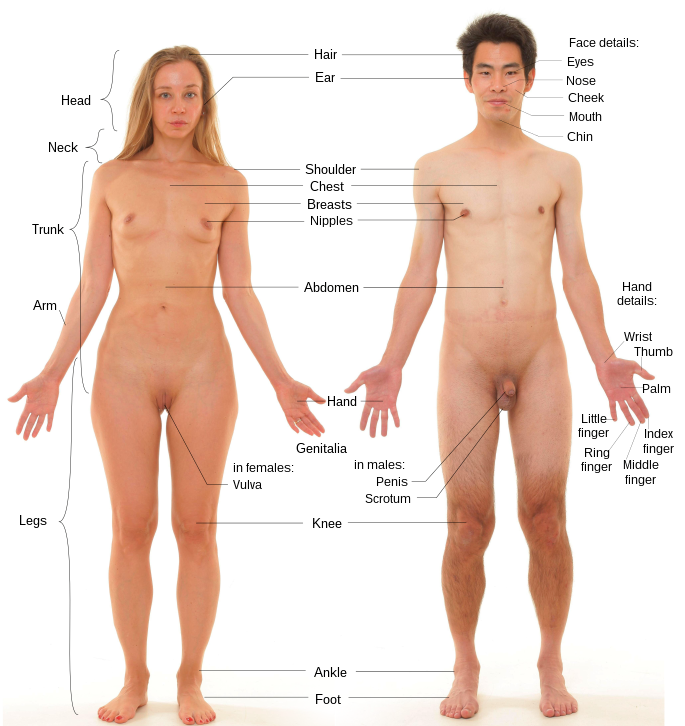
Source: City Studios, Stockholm Sweden, Mikael Haggstrom, September 29, 2011, CC 1.0, via Wikimedia Commons
Die to self, and you will live forever.

Take a close look at every feature of the male and the female body pictured above, to comprehend its obvious purpose in the evolutionary process. If we could see, for these individuals, the thoughts and world view and concept of self within the world, we would see the same thing, that all of these cognitive patterns also tend to serve, not the individual, but the larger thing of which he or she is a part. Notice, for a "way of life" example, that the otherwise naked female has applied color to all of her toenails. Every facet of each of these individuals is designed to promote evolutionary sucess for both genes and memes. (Similarly, your reaction to seeing this image of naked humans reveals wo or more aspects of human cognition, such as modesty, disapproval, or sexual arousal, that also exist because they serve an evolutionary purpose.)
These individuals, like you and this writer and every other living human being, exist for that purpose, and only for that purpose. Each of us is like a skin cell or a hair or a kidney that exists only for the purpose of serving the body that it is a part of. These individuals will die soon (if they have not already died), just as you, this writer, and every other living human will. The death of individual humans contributes to, and is a beneficial event for, the human species, in the same way and for the same reason that the death of individual cells within our bodies is beneficial for our bodies. Death is a part of the design of life.
The concepts of self, other, and world are figments of each of our imaginations. Repeat after me, "I am a figment of my imagination!" A skin cell has no cognitive ability, so cannot have concepts of self and other and world. We possess cognition, and our brains function as pattern recognizers, so we can conceptualize self, other, and world. But this cognition is merely patterns of neurons firing within our skull. Like a computer simulation, it has no external reality. Our ability to conceptualize self, other, and world does not distinguish us from the skin cell that cannot do so. Like the skin cell, each of us is significant only in the effect that we have on the larger thing that contains us.
The wise human individual lives forever, because he understands that "I" refers, not to his illusory self, but to the larger thing of which he is a part. The wise person understands, instinctively if not explicitly, that self is illusion. This is the true meaning of the theme in Christianity that if an individual dies to self, he will live forever. Such a person "lives in the spirit", which means that he or she lives in a state of love for the larger thing that he or she is a part of. For such a person, "the boundary between self and other still exists, but becomes unimportant". (Approximate or exact quote of Martin Buber,. ["I and Thou"], 1923 (german).)
This, then, is the meaning of unselfishness, that you understand yourself to be nothing but a part of something larger that you live to serve. Understanding that self is illusion, that, like a skin cell, you have no existence apart from the larger thing that you are a part of, transforms your concept of self within the world. It is by identifying, not with your illusory self, but with your larger thing, that you come into eternal life. With such an understanding, you will still have instincts to preserve the life of your body, and you will do so when those instincts are triggered. But your life will be animated by love, you will no longer live in fear, and your life will likely be bold and with enduring good effect.